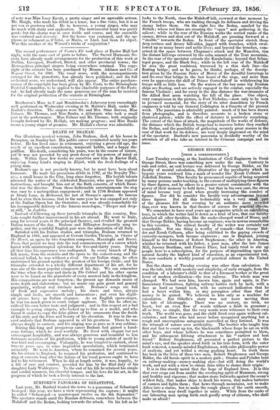DEATH OF BRA RAM.
Our illustrious musical veteran, John Braham, died, at his house in Brampton, on Sunday last. His public career ternthiated nearly ten years before. He has lived since in retirement, enjoying a green old age, the result of an excellent constitution, temperate habits, and a happy dis- poNon. His death, considering his years, was in the course of nature, peek— vas not preceded by any great decay of his powers of mind or body. Within these few weeks we ourselves saw him in Exeter Hall, enjoying Jenny Lind's singing in Elijah, with the fresh feelings of a young man. Braham's age is not precisely known, but he, must have been about fourscore. He made his precocious delrat in 1787, at the Royalty The- atre, a small house in the City, long since forgotten. His boyish talents attracted the notice of the celebrated Rauzzmi, who gave him regular instructions, and brought him out at the Bath concerts, of which Rauz- zini was the director. From 'those fashionable entertainments the step was easy to a metropolitan engagement; and in 1796 Braham appeared at Drury Lane, in Iffahmorul, the last of Storace's operas. So famous had he even then become, that in the same year he was engaged not only at the Italian Opera but the Oratorios ; and was already.remarkable for his incomparable delivery of the famous monologue, "Deeper and deep- er, still, " n Jephtha. Instead of following up these juvenile triumphs in this country, Bra- ham sought further improvement in his art abroad. He went to Italy, sang for several years at the principal theatres, and rivalled the greatest Italian tenors of the day. Braham and Billington frequently sang to- gether, and the youthful English pair were the admiration of all Italy.
Satisfied with his Italian studies and triumphs, Braham returned to England in 1801, and appeared at Covent Garden Theatre, in Chains of the Heart, an opera by two forgotten composers, Mazzinghi and Reeve. From that period we may date the real commencement of a career which lasted with uninterrupted splendour for five-and-thirty years. During all that time his supremacy. was undisputed. In every branch of Eng- lish music, from the oratorio and the opera to the concert-song and the national ballad, he was without a rival. On our Italian stage he often maintained his ground against the greatest of his foreign rivals ; and his triumphs extended to a wholly different department • of his art, for he was one of the most popular composers of his day. We can remember the-time when the songs and duets in The Cabinet and his other operas were to be found on the pianoforte of every musical lady in the kingdom. His compositions are now forgotten; the present age demands music of more depth and elaboration; but no music can gain great and general popularity. without real intrinsic merit. Braham's songs are full of fresh and expressive melody ; his duets and trios always simple and facile, are smooth and harmonious ; and even his slight- est ;pieces have an Italian elegance. As an English opera-singer, he was too much given to court vulgar applause. To this he often sa- crificed his own better taste and judgment; and in this respect set a bad example to young singers, who looked up to him as a model, and who found it easier to copy the false glitter of his ornaments than the finish of his style and the force and beauty of his elocution. It was in the sa- cred oratorio that Braham appeared in all his greatness. There he was always deeply in earnest, and his singing was as pure as it was sublime.
During this long and prosperous career Braham had gained a hand- some fortune, which he used worthily. He lived with elegant but not extravagant hospitality, and was always generous and bountiful to less fortunate members of his profession, while to young artists of merit he was kind and encouraging. Unhappily, he was tempted to embark, about twenty years ago, in some imprudent speculations, which terminated ruinously. He went to America, where he remained for several years. On his return to England, he resumed his profession, and continued to sing at concerts long after the failure of his vocal powers ought to have led to his retirement. When he did at length retire, it was, happily, to a life of ease and comfort, provided for him by the filial duty of his daughter Lady Waldegrave. To the end of his life he retained his simple and cordial manners, his cheerful temper, and his love for his art, in the progress of which he took a lively interest to the last.


























 Previous page
Previous page